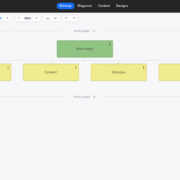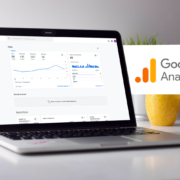9 Website Needs That You Should Know
Creating a great website for your business involves many crucial components. Building a site that is simple, clear, concise, and still includes everything you need to attract potential customers isn’t easy. Web design comes with many moving parts (much more than just choosing fonts), and it can be hard to keep track of it all. Luckily, we have compiled a list of some of the most important things you need for your company website.
-
Choose the Right CMS
A content management system (CMS) allows you to build your website without needing extensive knowledge on programming and HTML. Building a webpage from scratch requires coding in HTML, which is time-consuming and difficult even for an experienced web developer. It also makes edits and updates a troublesome task.
With a CMS, the level of technical knowledge you need depends on the building software. With all of its capabilities, WordPress can be more difficult for beginners to grasp, whereas Squarespace is more beginner-friendly.
Many CMS softwares offer plugins that can enhance their capabilities, along with high-quality templates if you’re struggling to get started. These can be particularly useful when building an ecommerce website.
-
Domain and SSL Certificate
There are several different ways to obtain your domain name. You have the option to purchase and register your domain name from a registrar such as Google Domains, which is usually a low-cost option.
Some CMS softwares offer a free domain as a part of your account’s plan, or a domain may be included in your web hosting plan. The easiest way is to obtain your domain from your CMS so you do not need to go through extra steps to connect your domain to the CMS. However, if this option is not available, the process of connecting your domain to your CMS should not cause too much trouble or confusion.
Once you have obtained your domain, obtain a Secure Socket Layer (SSL) certificate. This is what tells search engines and users that your website is secure. You know a website has an SSL certificate if its URL begins with “https://” instead of “http://”.
-
Web Hosting Service
In order for your website to be live and available to site visitors, you need a web hosting service. Some CMS softwares such as Squarespace include web hosting services in your plan, but others like WordPress require you to obtain hosting services elsewhere.
Examples of hosting services include Bluehost and DreamHost. Bluehost is designed for hosting WordPress websites since it does not offer its own hosting directly.
-
Data and Analytics Tracking
As a part of your overall digital marketing strategy, you need to collect data from your website. Data and analytics are necessary for making informed decisions on where to take your digital strategy in the future.
Whether you are a small business owner or involved with a much larger company, analytics are vital to your success. The most commonly used analytics tracking tool is Google Analytics, but search engine optimization (SEO) tools such as SEMRush are also very helpful.
The insights these tools provide, such as website traffic, impressions, clicks, conversions, total keywords, etc., are crucial for knowing if your website and overall strategy are effective, and if you need to make changes.
-
SEO Strategy
In order to have direction when developing your website, you need to define your SEO strategy. Determine which keywords you intend to try to rank for and understand how to utilize user experience and internal linking structure.
Your SEO strategy affects your website in many ways, making it very important to develop for your website to be successful. You need a good SEO strategy if you want your website to rank highly in search engines and drive more traffic to your website.
-
Proper Heading Structure
Heading structure is important, not only for your website’s users but also for search engines to crawl your web pages. Whether it’s a homepage, services page, contact page, landing page, about us page, or any other webpage on your site, you need a good heading structure.
Your headers guide users and search engine crawlers through your content and help them understand the purpose of the webpage. To do this well, you need to use headers wisely.
Heading structure should function similarly to an outline. The H1 on your webpage should be the page’s main idea and set the theme for the page. Following the body text under your H1, you should use H2s. Do not skip H2s and use H3s or H4s, as this will make your page harder to follow.
-
Call-to-Action (CTAs)
CTAs are your way of directing users to take desired actions, helping to turn clicks into conversions. Whether you are trying to make a sale, get newsletter subscribers, or fill out a contact form, your CTAs need to be clear and direct to be effective.
On your website, you have primary and secondary CTAs. Primary CTAs are prioritized and focus on your main objective, while secondary CTAs provide another conversion opportunity for users who don’t meet the primary objective.
-
Integrated Email Marketing
For email marketing, many people manually collect contact information brought in by contact forms and import them to their email marketing platform. Instead of this, some platforms allow for integration directly into your website.
When contact forms are filled out, they are automatically imported into your platform and become part of your email list. This is a huge time saver and helps make your website and email marketing strategy more seamless and effective.
-
Responsive Design
In order for your website to be user-friendly, you need to use responsive design. Responsive design refers to the website’s ability to adapt to the size of the screen that is being used to view it.
Responsive design is especially important for users on mobile devices, such as smartphones and tablets. The majority of all searches on the internet are performed on mobile devices, so if your website is not mobile-friendly, you could be missing out on a massive amount of traffic.
Still Need Help With Your Website?
Make no mistake, there is still a lot more that goes into website building than just 9 things. If we took the time to list everything you need to know, this would have been much too long. If you are still struggling and don’t know where to start with your business’ website, now is the time to reach out to us at iSynergy! We can help you out with any of your digital marketing and website needs.







